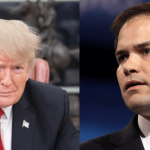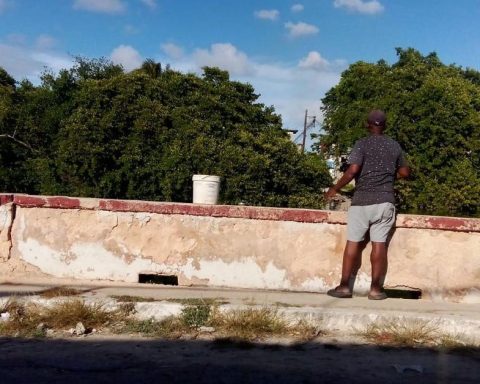When Paul Johnson is asked how the obstacles that currently hinder commercial and business relations between Cuba and the United Stateshis answer is synthetic and forceful: “persist”.
“I think the only way is persistence. We have to keep insisting, keep pushing for our goals. We cannot wait for others or be negative”, considers the president of the US-Cuba Agricultural Coalition (USACC), who has been on the island these days at the head of the US delegation that participated in the IV Agricultural Conference between both countries.
The event, which brought together producers and businessmen from both shores, intended to explore opportunities and strengthen ties in a sector that, even with Washington’s bans and sanctions on Cuba and the marked political differences, has been one of the points of spear in the bilateral approach. Not in vain, he lobby Agricultura is one of the most active promoters of greater trade and business with the island, something that the Cuban authorities have publicly recognized.
The reason for such persistence is clear, and Johnson confirmed it in an exchange with the press: even with the exception that allows the sale of food to Cuba —as long as payment is made in cash—, US farmers are losing access to food. a neighboring country, which imports around 80% of the food it consumes and which needs to attract foreign investment to revitalize its battered economy and, in particular, its depressed agri-food sector.
It seemed that the situation could change as a result of the thaw promoted in its last stages by the Obama Administration, but eight years later this has not been the case.
The arrival of Donald Trump to the White House turned that hopeful scenario upside down, and neither with Joe Biden as president, and despite the interest declared by various authorities —Democrats and Republicans alike— and businessmen from different states, the barriers and the delays remain.
“We are losing opportunities and we are tired of losing them,” the USACC president told reporters. We know that there are challenges and difficulties to face, but also new opportunities. Cuba needs more food, to import and produce it; even one of the reasons for the current wave of Cuban migration has to do with this shortage, and we feel frustrated, because we believe that it is something that we can solve from the United States.”
“I know that it is something hard right now, because there are political obstacles that make it very difficult to move forward, such as including Cuba on the list of countries sponsoring terrorism, and, on the other hand, we know that the daily life of Cubans is incredibly challenging, difficult, and from our country we could contribute to change that. I am as frustrated by this situation as many, but we cannot give up, and we have to attend to the opportunities that exist, and keep trying,” added the businessman.
work together
Since 2018, four Agricultural Conferences have been held between Cuba and the United States, in which, together with its Cuban counterpart, the USACC has been the protagonist. The coalition, which brings together US agricultural organizations, companies and producers, insists on the idea of, at the same time, pressing for its objectives in Washington, and promoting exchange and joint work with producers on the island.
“Working together we can improve the situation,” said Johnson, for whom “the connection between citizens of Cuba and the United States is the best hope for removing obstacles in bilateral relations.”
The recently concluded edition also pointed in this direction, which was attended by a delegation of 14 businessmen and farmers from states such as Arkansas, Kansas, Louisiana, Indiana and Washington DC, dedicated to the production and trade of food such as rice, soybeans and eggs.
As provided in the program, during the conference the visitors held meetings with producers, businessmen and Cuban authorities. They also visited Havana farms and markets, and received information from official entities such as the Cuban Chamber of Commerce and the Ministries of Agriculture, Food Industry and Foreign Trade, on the most recent measures of the Cuban government for the island’s agri-food sector. as well as the new policies and investment potential, which include cooperatives and private producers.
Agricultural Conference seeks to strengthen ties between Cuba and the US
Although at the inaugural session of the conference, Johnson did not rule out that an agreement or business could be finalized —something that, up to now, has not come to light—, he insisted on the value of these meetings to “explore opportunities”, “build trust” and “ deepen communication”, as well as to have first-hand access to the reality and transformations under way on the island and then share that information with colleagues and US authorities.
“What we are looking for is to deepen relationships, understanding, communication, which is the first step to move forward. Communication is always very necessary to better understand each other and achieve what we want,” he added. This exchange is very profitable and important for us, to be able to have information and be able to share it later with other American businessmen and farmers, and also when talking about Cuba with our authorities, with our government.”
“In the United States we have to stop thinking of Cuba as a government and start seeing it as a country of more than 10 million people, which needs to solve problems related to food, agricultural production and other issues, such as phytosanitary , which are common to us, and which also seeks to grow in trade and investment. If it were understood like this, I think we could move in the direction that interests us and that is beneficial for both countries, ”he said.
Looking at the private sector
For Paul Johnson and the USACC, the gradual opening of the island to the private sector, and the possibility of foreign businessmen investing and becoming associated with it opens a promising door for United States producers. Therefore, this is an element that he deems essential to put on the table for the authorities of his country.
“We must transmit to our government that the opportunities that exist today in Cuba are different from those of seven years ago. Now there is a private sector with which we could negotiate, and which we can support. That is an idea that we want to amplify in our country, with which we plan to go back and talk to our government to provide help to that private sector, ”he told the press at the conference.
US bipartisan delegation evaluates opportunities for trade in food and agricultural products in Cuba
When asked about how the United States could help private farmers on the island, Johnson did not hesitate to point out that, if the necessary authorizations and regulations are available, this contribution could be “in the first place banking, financial, because there is a lack of capital.” In this sense, he considers it important to have political and regulatory support that facilitates these operations, instead of stopping them.
“We are capitalists, we invest in private businesses around the world. Why then can’t we do it in Cuba? ”, Asked the businessman, who said that even he himself, like other colleagues of his, is waiting for a license from his government to invest in the island. “Let’s see, I think there are possibilities,” he said.
However, the USACC president goes beyond the strictly financial and highlights the value of the direct exchange and transfer of know how. In his opinion, it is “important to promote the connection between producers from the two countries, so that we can understand each other better, so that we can learn more about what the other party does and see what we can contribute to it.”
“One idea is that we can continue coming to Cuba to exchange with farmers and private businessmen, to help them here,” reflected Johnson. But I also think it would be interesting to invite Cuban producers to the United States, so that they can interact there with our producers, that they can see the methods used in our country, and that with that knowledge, with that learning, they can help when they return. to increase local production in Cuba”.
“We want to increase trade and investment in the agricultural sector, because that is important for both countries. But we also believe that know how we can contribute to increase local production on the island so that it can solve its problems in the agricultural sector. We have to talk to our government about this, and also insist on this issue in Cuba, because I believe that the private sector is a way to advance towards the development of our relations”, he concluded.
















